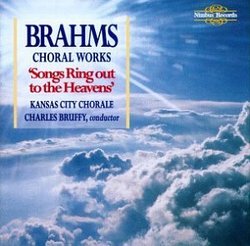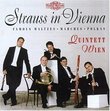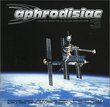| All Artists: Johannes Brahms, Charles Bruffy, Cynthia Siebert Title: Songs Ring Out to the Heavens: Brahms Choral Works Members Wishing: 0 Total Copies: 0 Label: Nimbus Records Release Date: 10/7/1997 Genres: Folk, Pop, Classical Styles: Vocal Pop, Opera & Classical Vocal Number of Discs: 1 SwapaCD Credits: 1 UPC: 710357552427 |
Search - Johannes Brahms, Charles Bruffy, Cynthia Siebert :: Songs Ring Out to the Heavens: Brahms Choral Works
 | Johannes Brahms, Charles Bruffy, Cynthia Siebert Songs Ring Out to the Heavens: Brahms Choral Works Genres: Folk, Pop, Classical
|
Larger Image |
CD DetailsSimilar CDs
|
CD ReviewsEtheral, moving, and polished! rrr338 | 09/29/1999 (5 out of 5 stars) "What more can be said of this splendid collection of chorale works by Brahms? Most of the selections are seldom heard, but after listening to the Kansas City Chorale perform them, you wonder why. The moods here range from joyous to bittersweet melancholy, although the Chorale never loses control, never allows the spirit of the music to become overshadowed by vocal hubris. All in all, music that is, like the cover suggests, sent from heaven." A TREASURE HOUSE DAVID BRYSON | Glossop Derbyshire England | 12/31/2004 (5 out of 5 stars) "There is a whole underworld of vocal music by Brahms that is very little known, and this is a very intelligent selection from it that I hope will do a bit to correct that state of affairs. Brahms's smaller choral and `chamber-choral' works cover a range of different styles. Also, as was typical of him in his instrumental music too, he sometimes issued alternative versions of the same piece, e.g. I have a performance of Vineta, sung here unaccompanied, with piano. Sometimes the style is severe, as in the two unaccompanied motets op 29, as also in Bach's unaccompanied motets. Even here the most casual listener would still know that this is not Bach. It is music of the romantic era that is not quite romantic in idiom. The rest of the disc is blatantly romantic in various ways, and some of it is perfectly gorgeous. It starts with the four songs op 17, which have the seemingly un-Brahmsian accompaniment of two horns and a harp. However little or nothing in Brahms is without a precedent in earlier German music if we just know where to look, and there are some things by Schubert that may have prompted him here. The rest is either unaccompanied (I prefer to reserve the term `a capella' for the stricter style of the motets), or with piano solo accompaniment, or, in the very appropriately-placed Zum Schluss from the New Liebeslieder waltzes that concludes the selection, piano duet. The disc starts with some heavenly romantic sound from the two horn-players, and ends with the equally heavenly Schubertian modulations of Zum Schluss or `Envoi', taking us on an interesting tour in between.
There are 24 members of the Kansas City Chorale, not including the conductor or the instrumentalists. Their singing is excellent, and their sense of style likewise. Britten also wrote a good deal of vocal music for chamber-ensembles, but he liked to keep the technical requirements of the music within the scope of amateurs. Brahms's stuff seems to me more demanding, music for off-duty professionals. There is not a lot that calls for criticism, and if I could have imagined a touch more subtlety here or there, heartiness is a better fault than artiness in music of this kind. One problem that the chorus-master and the recording consultants between them might have given some attention to (the poets seeming not to have) is some very sibilant s-sounds. Tennyson was acutely aware of this problem in his poetry, and took care to `kick the geese out of the boat' as he put it. It doesn't greatly detract from my enjoyment, and what I remember much more is the delectable sound right at the beginning of the record. For once I can report a really first-rate liner-note. It highlights what it ought to, namely the composer's early interest -- from childhood -- in the traditional methods and techniques of German music down the centuries. Schumann had preceded Brahms in this respect, but he took it to nothing like the same extent. It does not make Brahms any `conservative', as Schoenberg was at pains to point out. He was as deeply original as Wagner himself, but a scholar of minute and profound learning that fired his special creative sense. Texts are given with translations into English and the occasional misprint, and the recording is admirable generally. I hope the Kansas City Chorale will be encouraged in their project of bringing this marvellous music to the active notice of the musical public." |

 Track Listings (21) - Disc #1
Track Listings (21) - Disc #1


